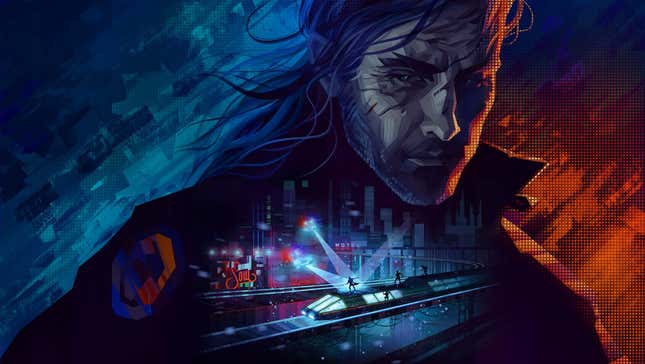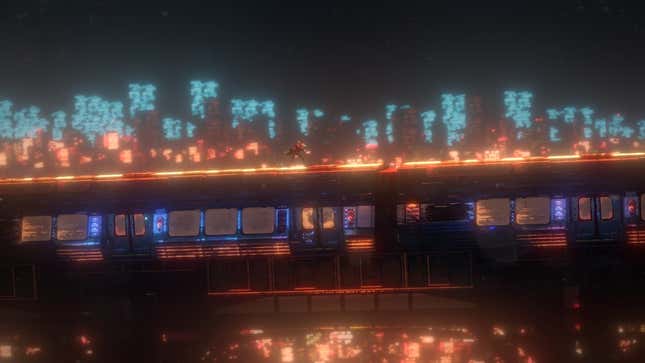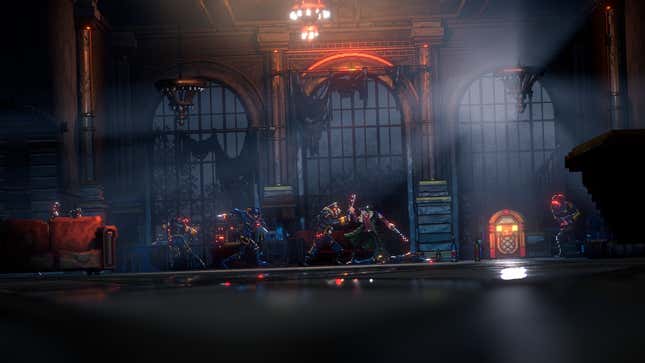
On gaming’s biggest stage, it can pay to be small.
No one could reasonably say that E3 2021 was short on spectacle. Following a year off due to the covid-19 pandemic, some publishers swung for the fences, showing off forthcoming tentpole games and offering initial reveals for games like Starfield and Elden Ring. If you’re even a casual observer of these affairs, you know that major publishers tend to build out their showcase setlists by spotlighting indie games. And this year, few stood out among the crowd more than Replaced, the debut game from Belarus-based Sad Cat Studios.
Read More: E3 2021's Prettiest Game Might Be This ’80s-Inspired Platformer
Replaced, a 2.5D platformer that oozes neon and ‘80s-inspired cyberpunk vibes, popped up midway through Microsoft and Bethesda’s joint E3 presser to near-instant oohs and aahs. Amid the praise, some pointed out similarities between Replaced and The Last Night, an indie platformer mired in controversy. But Replaced is looking a little more likely to complete development right now.
It’s not just the striking art or the crunchy-looking John Wick-ish combat or the absurdly compelling premise, in which the player is cast as an artificial intelligence program trapped inside a human body. Replaced caught my eye by catching my ear, mostly the result of some tremendously irresistible backdrop music—a dark, moody synth-pop track that sounds like an earworm you can’t quite pinpoint but definitely need to add to your Spotify library, stat.
This solid initial showing heralded an unprecedented level of attention for Sad Cat. Igor Gritsay, one of the studio’s co-founders, told me over a Zoom call that, for the first 72 hours after Replaced’s big stage debut, “basically the world almost stopped.” His phone rang off the hook. Notifications for comments and new followers rolled in by the seconds. “It was good—but, at the same time, you want to sleep as well.”
Like any game, Replaced, which has been in development for about three years, has gone through significant changes. At one point, even its core draw—the 2.5D perspective, amplified by that delicious pixel art—wasn’t established yet. Once upon a time, Replaced was “closer to 3D, like 2.75D,” said Gritsay. That idea barely lasted six months.
In that earlier build, the 2.75D one, Replaced featured complex camera rotations. You’d might round the corner of a building, and the camera would follow you, not unlike Fez, the 2012 indie puzzle game. That proved a herculean lift, particularly for a team that started out as just three people.
For instance, when you’d rotate the camera around a building, a sprite of the environment would stick out unnaturally, creating a disjointed look. What might seem like a small technical conundrum then spurred a whole line of existential questions about the project’s core tenets. “Do we make it a full 3D object? Then what’s the point of pixel art in this game?” said Gritsay. Adds Yura Zhdanovich, one of Sad Cat’s co-founders: “It was very disorienting.”

That’s not all. Incorporating 3D elements sparked a sense of confusion, in which it was all too easy to get lost while exploring. That meant designing a map system, says Gritsay, which introduced a whole new set of problems. When you’re talking about a narrative-driven, side-scrolling game, such navigational features are nice, but not exactly necessary.
So, it was settled. 2.5D. Bit more manageable that way.
“2.5 D is very vague in its definition because there are a lot of games that [say they’re] 2.5D,” said Zhdanovich. “From our perspective, 2.5D is, particularly in our case, a game that has depth within the environment but has a mostly linear type of side-scrolling gameplay.”
When Replaced comes out next year sometime, it’ll do so day and date as part of the Xbox Game Pass library. It’s a distribution model that’s radically changing how independent developers get their games in front of players—and, for some, giving them access to audiences beyond what they could reach with a traditional marketing campaign.
Game Pass, for those who don’t know, is Microsoft’s games-on-demand service, essentially a “Netflix for video games” sort of deal. First launched in 2017, a monthly fee gets you access to a few hundred games, plus any Microsoft-published title. You can then play those games indefinitely, so long as they remain in the library. Over the past few years, the service has exploded in popularity, claiming about 23 million members. For an indie studio releasing its very first game, that’s a whole lot of potential players.
“Within the scene, the major problem here is just [to] stand out, because there is a big competition among indie games. And also there’s this huge market of triple-A games that always capture all the attention,” said Gritsay. “The main motivation here is just to let more people know about the game … For us, it’s a single-shot opportunity. We need to take every possibility and every chance we have.”

The flipside here is that appearing on Game Pass could arguably cut into potential total sales. Think about it: If a movie is on Hulu or HBO Max or any other streaming service, why would you pay to rent it through traditional means? You can already watch it for “free.” The same principle applies to games on a games-on-demand library.
But Gritsay says that the studio still derives something valuable from the experience, and that Game Pass “helps [boost sales] somehow.” Gritsay did acknowledge that no open data exists for this sort of thing. (Microsoft doesn’t publicly share financial details surrounding agreements with developers. Last year, while speaking to The Verge, Xbox boss Phil Spencer described such deals as “all over the place.”)
Yes, the project has clearly ramped up in recent months, and it no doubt received a boost by showing up at such a high-profile event. But it’s still a long road to release—one that ostensibly ends during a broad and undefined “2022” window, which could always shift in a blink. And at the moment, Sad Cat isn’t ready to share more of the game beyond that initial peek.
“We’re taking it one step at a time,” said Zhdanovich.